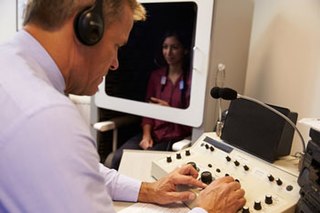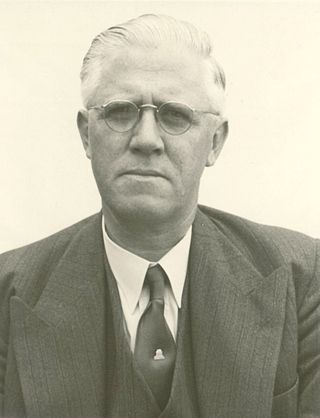Related Research Articles

Audiology is a branch of science that studies hearing, balance, and related disorders. Audiologists treat those with hearing loss and proactively prevent related damage. By employing various testing strategies, audiologists aim to determine whether someone has normal sensitivity to sounds. If hearing loss is identified, audiologists determine which portions of hearing are affected, to what degree, and where the lesion causing the hearing loss is found. If an audiologist determines that a hearing loss or vestibular abnormality is present, they will provide recommendations for interventions or rehabilitation.
Auditory processing disorder (APD), rarely known as King-Kopetzky syndrome, is a neurodevelopmental disorder affecting the way the brain processes sounds. Individuals with APD usually have normal structure and function of the ear, but cannot process the information they hear in the same way as others do, which leads to difficulties in recognizing and interpreting sounds, especially the sounds composing speech. It is thought that these difficulties arise from dysfunction in the central nervous system.
Aural rehabilitation is the process of identifying and diagnosing a hearing loss, providing different types of therapies to clients who are hard of hearing, and implementing different amplification devices to aid the client's hearing abilities. Aural rehab includes specific procedures in which each therapy and amplification device has as its goal the habilitation or rehabilitation of persons to overcome the handicap (disability) caused by a hearing impairment or deafness.
The UCL Ear Institute is an academic department of the Faculty of Brain Sciences of University College London (UCL) located in Gray's Inn Road in the Bloomsbury district of Central London, England, previously next to the Royal National Throat, Nose and Ear Hospital, the UK's largest ear, nose and throat hospital until it closed in 2019.
Marion Downs was an American audiologist and professor emerita at the University of Colorado Health Sciences Center in Denver. She pioneered universal newborn hearing screening in the early 1960s and spent over 30 years advocating for its adoption in hospitals, as well as for the provision of hearing aids to infants displaying hearing loss. Her efforts were aimed at raising awareness within the medical community about the developmental challenges associated with childhood deafness. Thanks to her initiatives, 95 percent of newborns born in America today undergo screening for hearing loss. As a result of her efforts, 95 percent of all newborns in America today are screened for hearing loss. She devoted her professional life to the promotion of early identification of hearing loss in newborns, infants, and young children and to helping deaf and hard of hearing individuals lead fulfilling lives.
Cognitive hearing science is an interdisciplinary science field concerned with the physiological and cognitive basis of hearing and its interplay with signal processing in hearing aids. The field includes genetics, physiology, medical and technical audiology, cognitive neuroscience, cognitive psychology, linguistics and social psychology.
Spatial hearing loss refers to a form of deafness that is an inability to use spatial cues about where a sound originates from in space. Poor sound localization in turn affects the ability to understand speech in the presence of background noise.

Pierre de Villiers Pienaar (1904–1978) was a South African Afrikaans academic and Professor at University of the Witwatersrand (Wits) and later at University of Pretoria, who pioneered Speech Language Therapy in South Africa and specialising in Audiology and Lexicography as well as being an Afrikaans author. As Lexicographer in 1973, he was part of the group of authors that established the Afrikaans Explanatory Dictionary alongside Prof M.S.B. Kritzinger and Prof F.J. Labuschagne.

Mohan Kameswaran is an Indian otorhinolaryngologist, medical academic and the founder of MERF Institute of Speech and Hearing, a Chennai-based institution providing advanced training in audiology and speech-language pathology. He is one of the pioneers of cochlear implant surgery in India and a visiting professor at Rajah Muthiah Medical College of the Annamalai University and Sri Ramachandra Medical College and Research Institute, Chennai. He has many firsts to his credit such as the performance of the first auditory brain stem implantation surgery in South and South East Asia, the first pediatric brain stem implantation surgery in Asia, the first totally implantable hearing device surgery in Asia Pacific region, and the first to introduce KTP/532 laser-assisted ENT surgery in India. The Government of India awarded him the fourth highest civilian honour of the Padma Shri, in 2006, for his contributions to Indian medicine.
The Institute of Health Sciences, Bhubaneswar, commonly known as I.H.S. Bhubaneswar, is a medical graduate college in Odisha. Founded in 1999, it offers medical degree courses in rehabilitation sciences, namely "Bachelor in Physiotherapy" (BPT), "Bachelor in Audiology & Speech Language Pathology" (BASLP), and, "Master in Audiology & Speech Language Pathology" (MASLP). The courses are recognized by the Government of Odisha, affiliated with Utkal University & approved by the RCI, New Delhi.
Despite having the largest economy in South America or Central America, Brazil is still considered a developing country due to its low gross domestic product, or GDP, per capita, low living standards, high infant mortality rate and other factors. "With regard to hearing health, the Brazilian government established the national policy for giving attention to hearing health in 2004, in which the Ministry of Health, considering the social magnitude of hearing impairment in the Brazilian population and its consequences, presented the proposal to structure a network of services set up by regions and in hierarchy that aims to be implemented in all federative units of Brazil, with integrated actions to promote ear health, hearing impairment prevention, treatment and rehabilitation organized and managed by the National Health System, Sistema Único de Saúde (SUS), in Portuguese," writes Bevilacqua et al. (2010)

Suzanne Carolyn Purdy is a New Zealand psychology academic specialising in auditory processing and hearing loss. She is currently a full professor and head of the School of Psychology at the University of Auckland.
Sharon G. Kujawa is a clinical audiologist, Director of Audiology Research at the Massachusetts Eye and Ear Infirmary, Associate Professor of Otology and Laryngology at Harvard Medical School, and Adjunct Faculty of Harvard-MIT Health Sciences and Technology.and specialist in otolaryngology, Her specialty is the effects of noise exposure and aging on auditory function.

Debara Lyn Tucci is an American otolaryngologist, studying ear, nose, and throat conditions. She co-founded the Duke Hearing Center and currently serves as a professor of Surgery and Director of the Cochlear Implant Program at Duke University. In September 2019 she became Director of the National Institute on Deafness and Other Communication Disorders, one of the National Institutes of Health's 27 Institutes and Centers.
Sandra Gordon-Salant is an American audiologist. She is a professor at the University of Maryland, College Park, where she is also director of the doctoral program in clinical audiology. Gordon-Salant investigates the effects of aging and hearing loss on auditory processes, as well as signal enhancement devices for hearing-impaired listeners. She is the senior editor of the 2010 book, The Aging Auditory System. Gordon-Salant has served as editor of the Journal of Speech, Language, and Hearing Research.
Bolajoko Olubukunola Olusanya is a Nigerian paediatrician. She is a specialist in audiological medicine.

Richard Charles Dowell is an Australian audiologist, academic and researcher. He holds the Graeme Clark Chair in Audiology and Speech Science at University of Melbourne. He is a former director of Audiological Services at Royal Victorian Eye and Ear Hospital.
Computational audiology is a branch of audiology that employs techniques from mathematics and computer science to improve clinical treatments and scientific understanding of the auditory system. Computational audiology is closely related to computational medicine, which uses quantitative models to develop improved methods for general disease diagnosis and treatment.
Judy R. Dubno is an American scientist and researcher in the field of audiology. She is a distinguished university professor and director of research in the department of otolaryngology at the Medical University of South Carolina in Charleston. She is recognized for her scientific contributions to the understanding of presbycusis, a condition of hearing loss that occurs gradually for many aging adults. She has been involved in the development and implementation of several new methods for assessing hearing loss, including the Hearing in Noise Test (HINT) and Speech Intelligibility Index (SII). She has won numerous awards for her work, including the Jerger Career Award for Research in Audiology in 2011. She served as President of the Acoustical Society of America from 2014 to 2015.
Colette McKay is an Australian audiologist, academic and researcher. She leads the translational hearing program at the Bionics Institute of Australia.
References
- 1 2 3 4 5 Kim, Stefani (2018-06-12). "ICRA Fellow Harvey Dillon, PhD, Named Officer of the Order of Australia". The Hearing Review. Retrieved 2023-07-07.
- 1 2 "Harvey Dillon". Macquarie University. Retrieved 2023-07-07.
- 1 2 "Adjunct Prof. Harvey Dillon - The HEARing CRC". www.hearingcrc.org. Retrieved 2023-07-07.
- ↑ "A/Prof Harvey Dillon was awarded the prestigious Aram Glorig Award". Australian Hearing Hub. 2016-10-17. Retrieved 2023-07-07.
- ↑ "Australian Hearing Researcher Chosen to Receive Callier Prize". News Center. Retrieved 2023-07-10.
- ↑ "OFFICER (AO) IN THE GENERAL DIVISION OF THE ORDER OF AUSTRALIA" (PDF). The Governor-General of the Commonwealth of Australia. Retrieved 7 July 2023.
- ↑ "Members — ICRA Audiology". icra-audiology.org. Retrieved 2023-07-07.
- ↑ "Dr Harvey Dillion". ABC listen. Retrieved 2023-11-08.